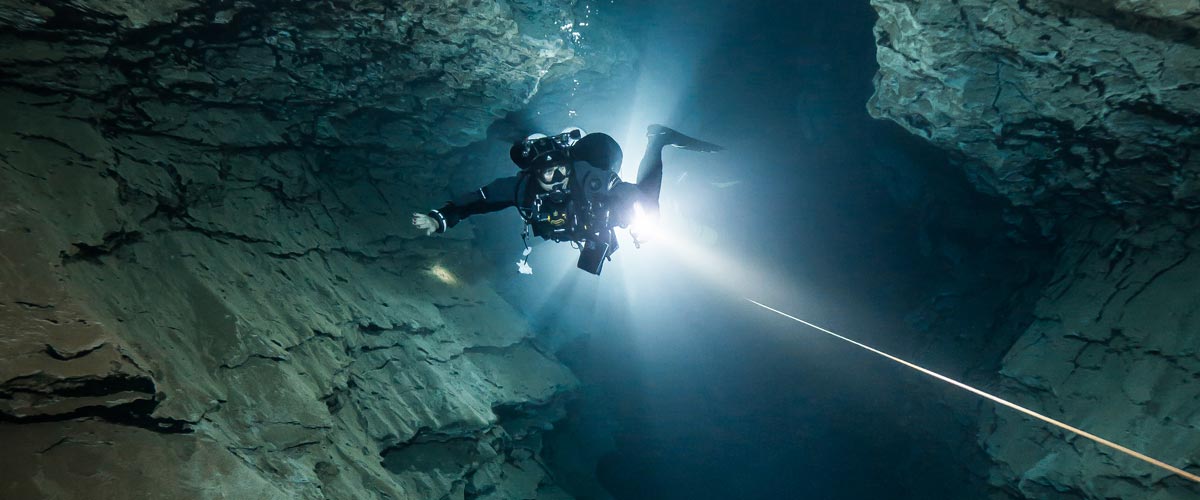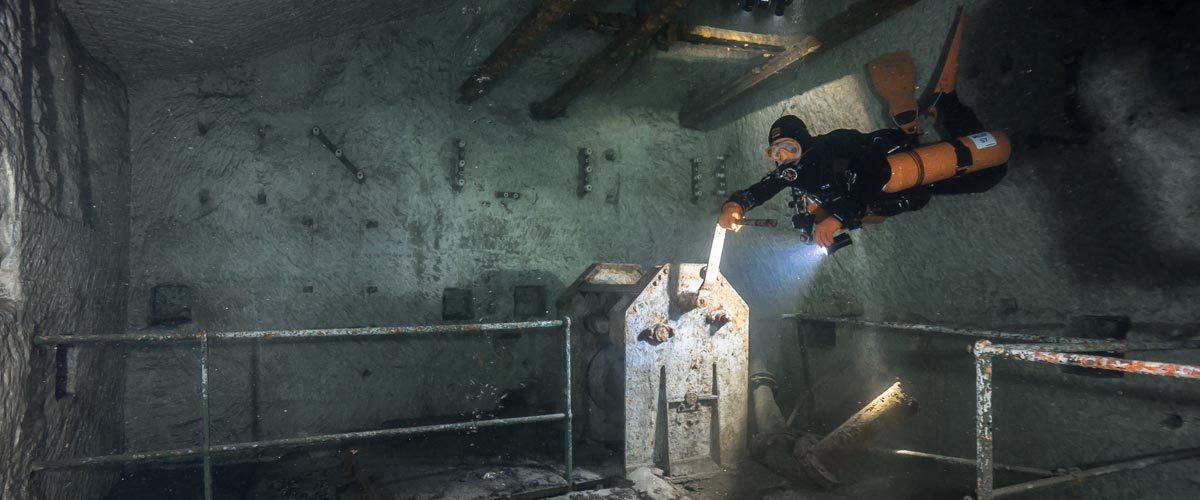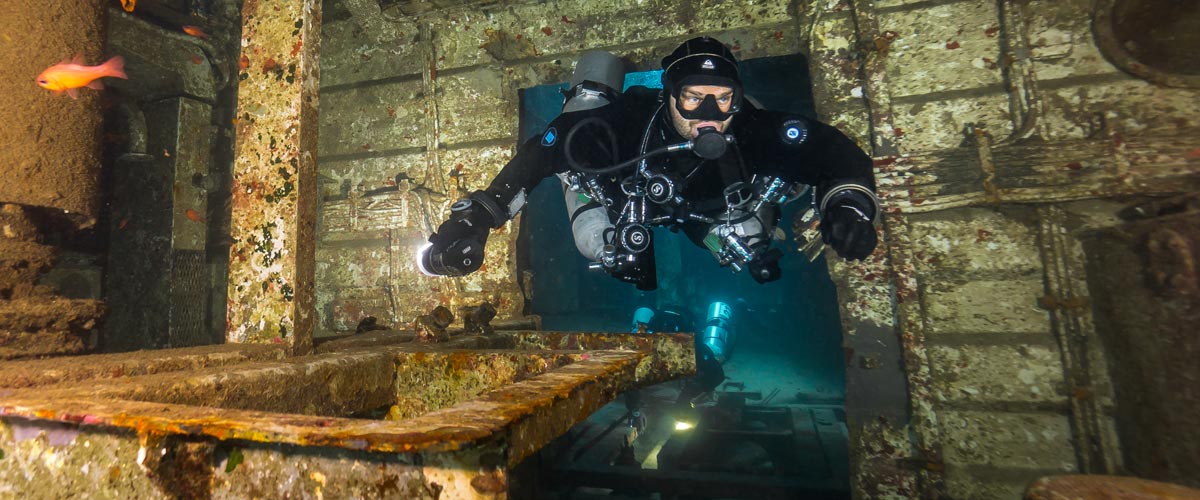Dive Training Blogs
Scuba Diving: It’s Not Just for Vacation
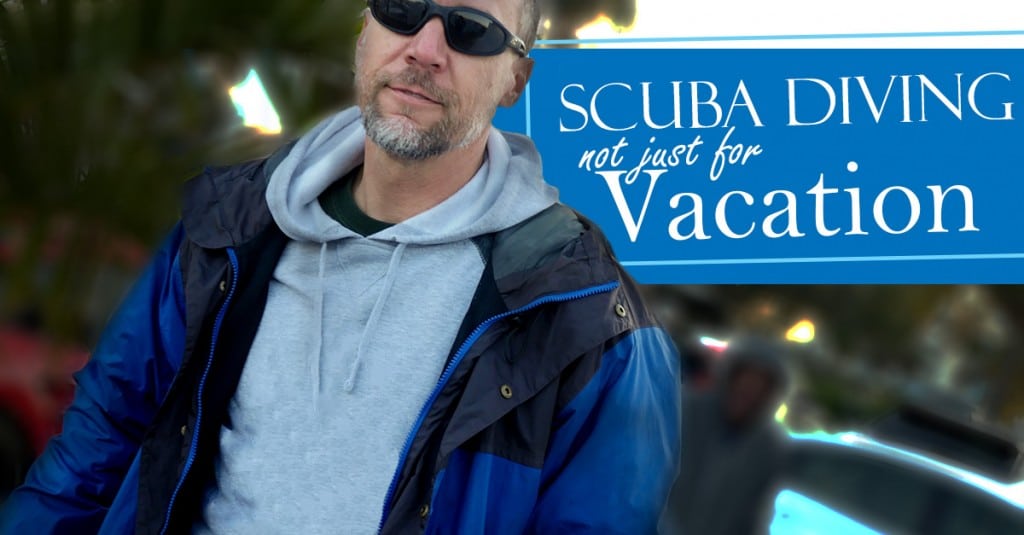
By Dillon Waters
The days of scuba diving being considered a bucket list item you check off on a random tropical vacation are long gone. Scuba diving is a growing lifetime recreational activity that has families, friends, and individuals all bonding over the beauty of the new world they’ve discovered. Did you know scuba offers many other benefits besides the obvious exercise and sightseeing opportunities? These are benefits for divers of any age too!
Now let’s look at just a FEW things that scuba diving can be used for:
Education
Scuba diving allows people to enter a different world full of new and exciting things. For divers of any age, this can create a thirst for new knowledge and, after your initial certification, the opportunities to learn more about the underwater world continue to grow. There are a plethora of specialty courses that offer you a chance to learn different activities while diving and, since scuba courses are egalitarian, you and your family or friends can take the classes together without the worry of being the person who knows the least.
Conservation
Scuba divers learn to love the water and the creatures that call it home. For many divers, marine conservation becomes an important part of their thinking and they want to do their part to help protect it. In addition, citizen science courses offer students the opportunity to apply the knowledge they are learning in the classroom to something practical and useful in the real world. This can mean volunteering to help build coral reef trees in the Florida Keys, raising awareness in their local communities, creating non-profit groups, or even deciding to take up marine conservation as a career path.
Therapy
If you were to ask a group of divers what scuba is to them, you will probably hear many variations of the same answer: therapeutic. Diving has a surreal meditational feeling that seems to silence the outside world and the mundane reality that comes with it. All your above-water problems are left at the surface. As we breathe throughout a dive, we tend to breath slower and deeper than normal, which induces a state of calmness. This allows you to enjoy your underwater surroundings in an almost surreal state of being and helps you feel mentally relaxed once your day of diving is over.
Rehabilitation
Scientific research conducted by John Hopkins University has shown that scuba diving greatly assists those with serious physical injuries and is exceptionally successful in reducing reported symptoms of Post-Traumatic Stress Disorder (PTSD) and Traumatic Brain Injury (TBI). It is no wonder the therapeutic benefits of scuba are being used to treat physical and emotional disabilities among soldiers and many other groups of people and is being researched for other types of rehabilitation. Check out www.sudsdiving.org and our adaptive scuba courses in the Scubility program for more information.
Hobby
If you are looking for a new hobby to do in your free time, there are plenty to choose from as a diver. Many of your land-based hobbies can also be practiced underwater. If you enjoy photography, underwater photos can be a wonderful addition to your portfolio. A history buff can focus on diving historical dive sites and shipwrecks, while someone who enjoys marine life can dive coral reefs or do a shark dive. Or let’s say that you enjoy hunting and fishing, you could combine the two with diving and begin spearfishing on the weekends. No matter what it is that you like to do, you can more than likely find a way to do it below the surface too.
Adventure
Scuba diving gives you an undeniable sense of adventure. There is an entirely new world underwater with its own species, communities, and ways of life waiting to be discovered by you. With 71% of the earth being water, it goes without saying that if you want to “see the world”, you need to break free from the larger reality of the other 29%. Not only is being underwater a part of the adventure, but the new places you will travel for diving may be ones that you had never considered going before. In short, scuba diving allows you to see and experience things that can be found in no other way!
Community
Scuba is a social sport. You will meet many new people and make new friends from all over the world in an intercultural exchange. Just by going out and diving, you will begin to build relationships within the local and world diving community. In addition, when children become scuba divers, they will be immersed in a multi-generational circle of healthy-living adventure enthusiasts. Once certified, you may find local dive clubs in your community that you didn’t know existed, or you can even start one of your own! Attending or hosting a dive club meeting is a great way to meet the local divers in your area, share dive stories, and learn about new dive sites that you will want to try out. Of all the things that scuba has given me the opportunity to do, the part I enjoy the most is being involved in the community that is built around it.
Scuba diving has long been seen as an activity that you would participate in on a tropical vacation, or as part of a cruise package, to check off yet another bucket list item. Scuba is much more than a one-time vacation activity though, and once you are certified, the opportunities become almost endless. Not only does scuba offer something for almost anyone, it can also benefit you, your family, and your friends in many ways!
The benefits that this sport has to offer could be talked about all day, but the only real way to see them all for yourself is to complete your scuba certification and immerse yourself into the world of underwater enthusiasts. Contact the instructor or dive center that shared this article today, or locate the dive center closest to you using our locator, and ask them what it’s like to be a scuba diver.
To find out more about International Training, visit www.tdisdi.com.

Blogs
Intro to Tech: What is it about?
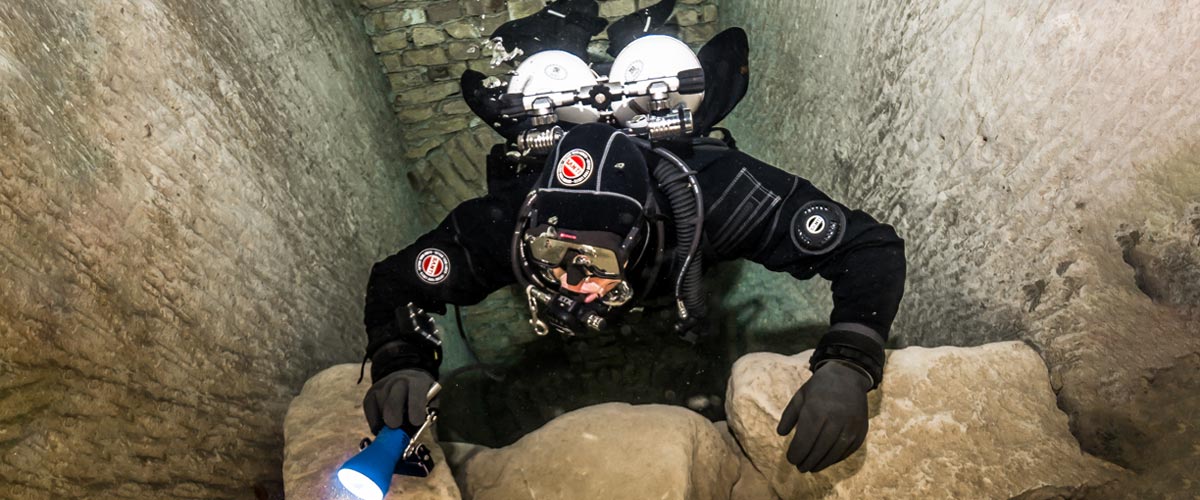
Article by José Pablo Mir
Pictures by Cezary Abramowski
The world of technical diving is exciting. It opens the door to new sites, depths, and bottom times. More importantly, it opens our minds to a new way of planning, facing, and experiencing dives, even those not purely technical.
Becoming a technical diver is a process, and like in other aspects of life, we should find the proper entry point that suits us best based on our knowledge and experience. The Introduction to Technical Diving course from TDI -the world’s largest and most recognized technical diving teaching organization- is the best option for divers who have yet to gain experience in the fundamental aspects of this new practice. The course’s content and its embrace of new techniques and technologies make it possible to acquire a solid foundation to learn and gain experience in this practice properly.
Becoming a technical diver is not something that happens overnight, whether deciding to become one or receiving a certification card stating we are now technical divers. It is a slow process extending farther away than any introductory course. It requires effort and dedication. But it will bring us satisfaction from day one -or two.
It is a matter of mentality
First, we must understand and accept that technical diving, involving greater depths, longer bottom times, exotic gases, virtual or real ceilings, and more, comes with higher levels of risk than the sport diving we have been practicing until now.
Although this discussion usually starts with a warning about risks, as I’ve done in the previous sentence, our practice is not a game of chance.
Technical diving is a rational activity that requires maturity and good judgment, and we will put everything into ensuring that each dive is a successful one -meaning we return from it safe and sound. With this understanding, we will strive to establish a mental attitude more aligned with our practice and its realities.
This new “technical diver” mindset we will develop will lead us to be more cautious in our executions, more analytical in our plans, more rational in our strategies, and more detailed in our procedures.
Experience will keep teaching us to know ourselves better, to keep our anxiety and other emotions under control, and to manage our impulses. Over time, our senses will sharpen, and we will be more attentive to the particulars of the situation we find ourselves in.
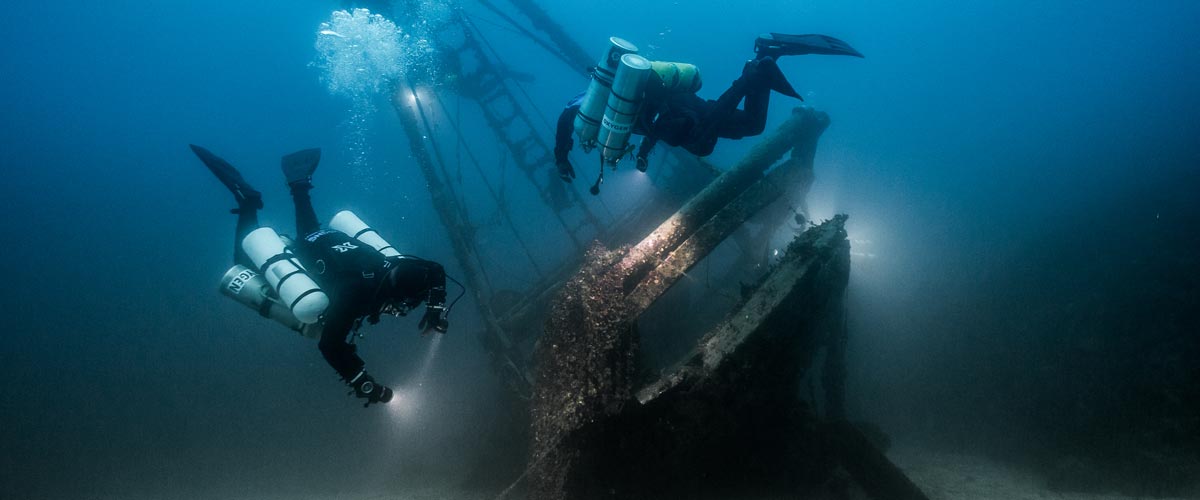
Strategies and procedures
Our strategies, those broad guiding lines tracing the path to follow, from how to approach planning to where, with what, and how we are willing to get there, will be more specific and more practical. Not because they magically become so, but because we will consciously and deliberately frame them that way.
We will establish clear, concise, and realistic procedures. Not only for the undesirable situations that may present themselves but also for those that are part of our dive objectives.
Even though, as technical divers, we often use equipment different from what we were previously accustomed to, it is essential to note that the gear does not make the diver. In a way, we could consider such equipment as the necessary tools to implement what our goal seeks to achieve, according to our strategies and procedures.
Technique plays an important role
We must put our greatest effort into learning and perfecting the different techniques we will be acquiring. Buoyancy, trim, propulsion, cylinder handling, deploying DSMBs and lift bags, valve drills, and more are essential skills we must begin to master to progress in our art. What we cannot do, when we need to do it, can harm us.
Our techniques must be effective and achieve the purpose for which they were devised. But they must also be efficient and require the least resources possible, including the time they take and the effort they demand. Effectiveness and efficiency will prevail over beauty and other considerations that may come to mind, although none of them should be mutually exclusive. A technique executed efficiently and effectively tends to have an inherent beauty.
Refining techniques is a lifelong mission. Some of them will be easy to master from the go; others, on the other hand, will be our life mission and will require many repetitions just to resemble the idea we have in mind of how they should be executed.
We must consider the environment
Our learning, the needs and musts of the practice we engage in, the experience we gradually gain, our strategies and procedures, and even our equipment and tools change with the environment.
Diving in the ocean, everything about us must be suitable for ocean dives. Conditions there rarely emulate those found in a pool, lake, or river. Variable winds and currents, greater depths, visibility conditions, other divers with uncertain skills around us, marine life, maritime traffic, distance from the coast, and many other factors add complexity and uncertainty.
It is never necessary to master the pool on the first day, but planning and aspiring to gradually cope with the ocean’s conditions is essential.
The cost of good training
We are aware that our resources are often scarce in relation to the possibilities of use we could give them if they were not. To a greater or lesser extent, we are part of the economic reality in which we are embedded.
Fortunately, the cost of good technical diver training is not an entry barrier. Comparing training and equipment costs, we see that the former are generally lower. Yes, lower cost for personalized service, essential to our future
performance and safety, than for a series of mass-produced products that are mere, albeit necessary, tools for an end.
The value of good training
The value of the training we received encompasses a range of characteristics, from emotional and methodological to technical and technological. TDI and its Introduction to Technical Diving course offer a deep and modern approach, with a teaching strategy that aims to create thinking divers, not merely obedient ones.
As technical divers, our knowledge is our primary tool. In this type of activity, what we don’t know can harm us.
Is this course optional?
Unfortunately, the fact that this Introduction to Technical Diving course is not a prerequisite for any subsequent training is an invitation to consider it optional. And we all know what usually happens to “optional” under budget constraints.
However, this course should be seen as optional only by those divers who are somehow familiar with the use of technical equipment, who have a mindset more in line with the requirements of this type of diving, who plan and execute the dives the proper “technical” way, who know their gas consumption rate, who are not intimidated by non-decompression tables, who feel comfortable using their dive computers, and know the techniques and have at least an acceptable level of buoyancy, positioning, and propulsion. Those can go straight to a more advanced training course, such as TDI’s Advanced Nitrox.
We must ask ourselves whether or not we are in that group.
Remember our goal: to have fun
Recreational diving is our passion. Jumping into the water carrying heavy equipment and having properly dotted our I’s and crossed our T’s have only one ultimate goal: fun. This is the activity we have chosen as a hobby. We must enjoy it; it must give us pleasure and make us vibrate.
Having a good time is not optional!
Blogs
Four opportunities to go pro in 2024 with Dive Friends Bonaire
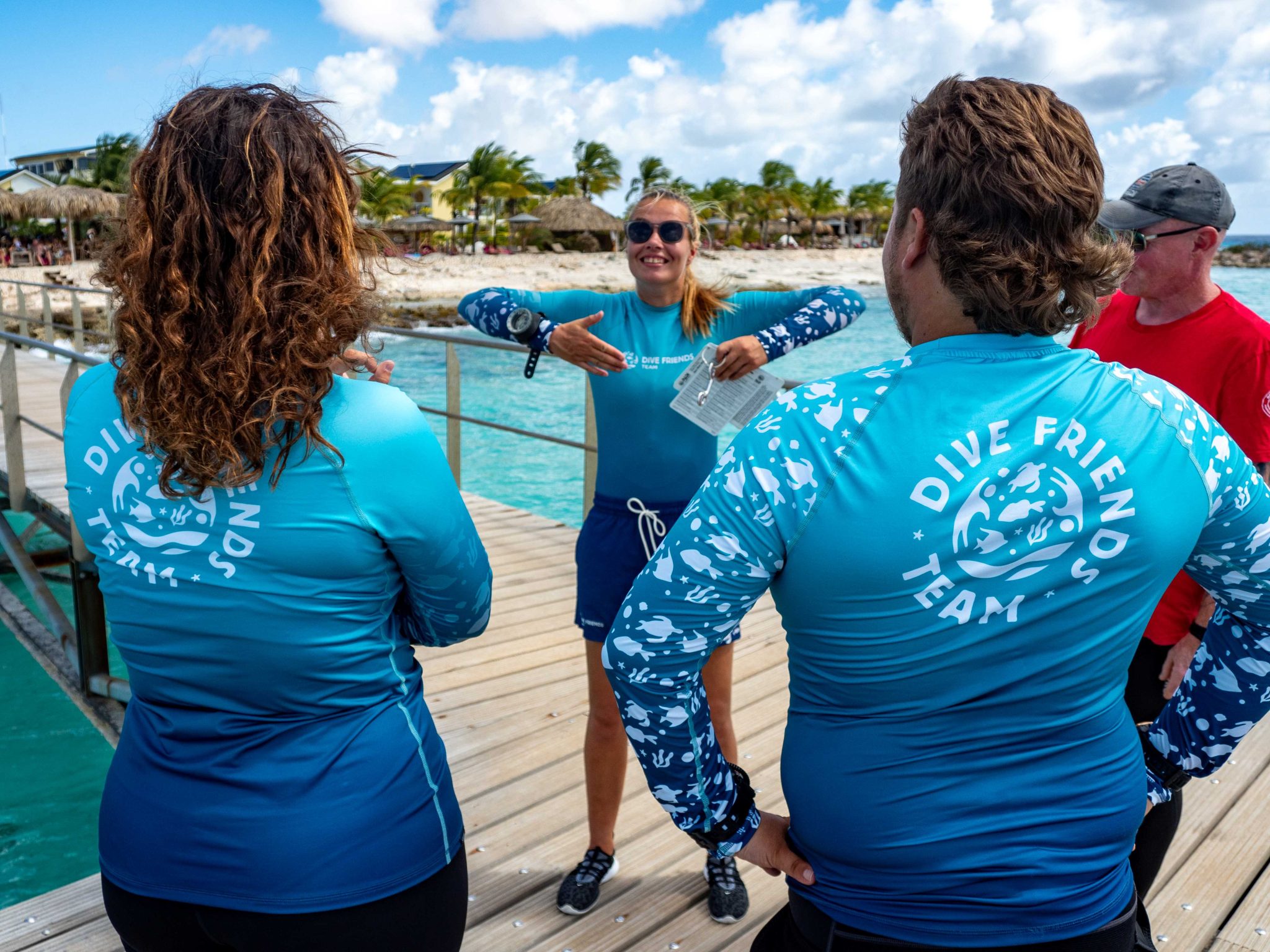
Dive Friends teaches the Instructor Development Course (IDC) several times a year to students who are eager to share their passion for diving with the world.
Dive Friends is known for the personal approach throughout the course. Their in-house course director will lead the students through every essential step, mentoring them to achieve their fullest potential as a dive instructor.
Applications for the following IDC start dates are now open:
- 12 April
- 5 July,
- 20 September
- 29 November
Partnership with Casita Palma
If the student opts for the IDC-Deluxe or IDC-Supreme package, their accommodation will be arranged for them at Casita Palma. This small and quiet resort is within walking distance from Dive Friends Bonaire’s main dive shop location and has everything you need to relax after an intense day of IDC training. Breakfast is included, so the student will always be fuelled and ready for their day.
Contact Dive Friends Bonaire’s Course Director Eddy for more information: coursedirector@divefriendsbonaire.com.
-

 News3 months ago
News3 months agoHone your underwater photography skills with Alphamarine Photography at Red Sea Diving Safari in March
-

 News3 months ago
News3 months agoCapturing Critters in Lembeh Underwater Photography Workshop 2024: Event Roundup
-

 Marine Life & Conservation Blogs2 months ago
Marine Life & Conservation Blogs2 months agoCreature Feature: Swell Sharks
-

 Blogs2 months ago
Blogs2 months agoMurex Resorts: Passport to Paradise!
-

 Blogs2 months ago
Blogs2 months agoDiver Discovering Whale Skeletons Beneath Ice Judged World’s Best Underwater Photograph
-

 Gear Reviews3 months ago
Gear Reviews3 months agoGear Review: Oceanic+ Dive Housing for iPhone
-

 Marine Life & Conservation2 months ago
Marine Life & Conservation2 months agoSave the Manatee Club launches brand new webcams at Silver Springs State Park, Florida
-

 News3 months ago
News3 months agoWorld’s Best Underwater Photographers Unveil Breathtaking Images at World Shootout 2023















